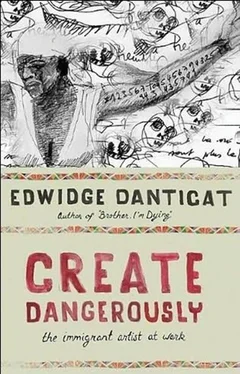Once he’d offered his condolences to Tante Zi over the phone, my father asked me to pick up the extension and tell her that I would take care of things, would get Marius’s body sent to her in Haiti.
After offering my own condolences to a tearful and hiccupping Tante Zi, I asked her where Marius was living before he died.
She paused as if to breathe past a large lump in her throat, and then whispered, “Miami,” sounding puzzled, as if wondering why I was making her repeat something she’d already repeated many times.
“Do you have the address of the place where he was living in Miami?” I asked.
“No,” she said. But she did have the telephone number of Marius’s roommate of two years. His name was Delens.
I would call Delens, I told her, and get back to her.
I dialed Delens’s number soon after I hung up with Tante Zi and asked in Creole if I could speak with him. The young man who answered replied, “Would you mind speaking English? I grew up here. It’s hard for me to speak Creole.”
It turned out that he was Delens. I told him, in English, that I was Marius’s cousin and was trying to help locate his body to send it back to Port-au-Prince. Could he help me?
He gave me the number of the Freeman Funeral Home, where Marius’s body had already been placed while awaiting expatriation. He didn’t have the amount of money the funeral home charged and Tante Zi didn’t trust him enough to send it to him, accusing him of being responsible-in some way that he could neither comprehend nor explain-for Marius’s death.
At the end of the conversation, I cautiously asked Delens in my most polite voice, “Can you please tell me what Marius died of?”
“Move maladi ya ,” he responded in perfectly enunciated, nonaccented Creole. The bad disease, a euphemism for acquired immune deficiency syndrome, or AIDS.
“When did it happen?” I asked. “When did he get it?”
“I don’t know.” He switched back to hip-hop-toned English. “Maybe he had it even before he left Haiti. I don’t know. But he’s been living wild here, man, made some stupid-ass mistakes.”
“Did he leave anything behind?” I thought Tante Zi might want to know. Maybe he had some assets that could help mitigate the transportation and funeral costs. But I wasn’t thinking only about money. Perhaps there were more personal effects, legal papers, letters, photographs, journals, keepsakes that later on might comfort his mother.
“He had nothing,” Delens replied harshly. “He was living it up and wasted everything. All he had when he died was sixty dollars.”
Rightly or wrongly, I couldn’t accept that a thirty-year-old man had left nothing else behind. When I hung up and summarized the other end of the conversation for my father, he told me that Tante Zi believed that Marius had been poisoned by his roommate, but almost everyone in the family had different theories. There were those who thought he had committed suicide and others who were certain he’d died of a drug overdose. I didn’t know what or whom to believe, but it really didn’t matter. A grieving mother was waiting to be reunited with her son. And since she couldn’t come to him, we had to find some way to bring him to her.
The funeral, if held in Miami, would cost three thousand dollars, Mr. Freeman told me when I called. But for Marius’s body to be shipped back to Haiti, the price would go up to five thousand. He’d already had Marius for a day or two now and would be happy to ship him to the funeral home of our choice anywhere in the Haitian capital, but he needed “papers.”
“What kind of papers?” I asked.
Because Marius had come to Miami by boat and had never received asylum or legalized his status some other way, he was undocumented.
“I have to get him exit papers from the Haitian consulate,” explained Mr. Freeman. “The U.S. authorities will want to see these papers at the airport before he leaves and the Haitian authorities will want to see them when he arrives.”
“He’s a dead man whose cadaver needs to be shipped to the country where he was born. Why is it so complicated?” I asked.
“In part,” he answered calmly, “because he’s an alien.”
Were we still aliens in death, I asked, our corpses unwanted visitors still?
Fortunately, Delens managed to find Marius’s Haitian passport, so Marius would certainly be granted exit papers by the Haitian consulate, Mister Freeman assured me. It was simply a matter of time.
“But that’s not the only thing,” he continued in the same unruffled ministerial voice. “It’s also complicated because of the disease he died of. There are some special procedures involved with these types of corpses.”
Even though it was probably written in large bold letters on Marius’s death certificate, no one wanted to name the disease that had killed him. It was as if in some bizarre way they were all respecting his dying wish. Silence at all costs.
The next day, I called Tante Zi and explained all that I’d learned about Marius’s return to Haiti. Tante Zi was aware of the funeral home cost, she said; she just wanted to confirm that Delens was telling the truth. She was ready to make a money transfer. She even had Mister Freeman’s information.
“Marius should be home soon,” my father told her.
Before she hung up, Tante Zi began sobbing again and then added, “Look how they took my boy from me and took everything he owned on top of it.”
Marius had been sending her a few hundred dollars each month, Tante Zi said. There was no way he could have been broke. And he didn’t die of the “bad disease” either. He’d called her once a week, every Sunday, and promised her he’d come back to see her as soon as his papers were in order. During those talks, he was always full of laughter and hope. He never sounded like a sick person.
My father abruptly interrupted Tante Zi’s tearful recollection and told her to calm down, to make sure she had her head on straight so she could face what lay ahead.
“You haven’t seen your son in years,” he reminded her. “He’s coming back to you in a coffin. Met fanm sou ou . Be the strong woman you have to be.”
Tante Zi, who often openly said that she loved my father more than all her other siblings-just as she said of all her other siblings that she loved them more than the others-agreed.
“You’re right, brother,” she said, still sniffling in my ear on the other extension. “I’ll have to pull myself together to face this.”
“I am sorry I can’t come there to be with you,” my father, who was recovering from very early symptoms of the pulmonary fibrosis that would eventually kill him, said to Tante Zi.
“I understand, brother,” she said.
Three days later, Marius’s exit papers came in. After eight days in Mister Freeman’s morgue, Marius was going home. In the meantime, my father had a sudden crisis with his health and I missed Marius’s departure day. Marius’s body was shipped to Port-au-Prince. I couldn’t find another seat on a flight, so I missed his arrival in Port-au-Prince and his wake and burial, too.
When I got to Haiti, I didn’t immediately visit the family mausoleum where Marius was buried. I didn’t have to. Tante Zi had had the entire funeral photographed and a small souvenir album made. The most eye-catching pictures were of Marius lying in his silver coffin in a dark suit and tie, his hands carefully folded on top of his belly. His dark bloated pancake face was sculpted around a half grin that makes it hard to imagine what he might have looked like under different circumstances.
I saw Tante Zi several times that summer in Haiti, once at the baptism of her newest granddaughter, the child of her only daughter, Marie. She also came to visit me at the seaside campus where I was working, helping to teach a college course to American students.
Читать дальше












